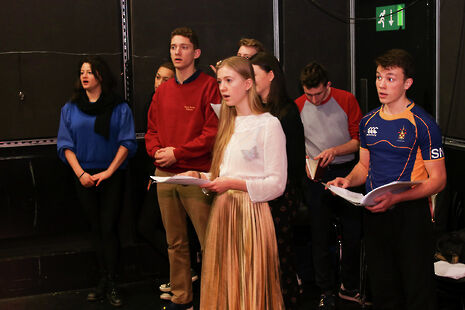Romeo and Juliet preview: ‘Cambridge’s best talent’
A professional theatre and professional direction for Cambridge students as Shakespeare is reimagined in 1930s Andalusian Spain

There are certain staples of the Cambridge theatre scene which, year upon year, draw the best talent and dazzle audiences. The Cambridge Arts Theatre Show is one such slot: a professional director, a professional theatre, working with students on the stage and behind the scenes. This year Tom Littler directs some of Cambridge’s best talent in Romeo and Juliet – reimagined in 1930s Andalusia. And take my word for it, you don’t want to miss this one.
I sit down to talk with the team in the plush corridors of the Arts Theatre. Tom Littler, the Director, is running on a tight schedule but finds five minutes to talk me through his vision for the show. My first questions are about the somewhat unexpected setting. Littler explains that he began the process by looking for a world for the Bard’s work, looking for something that speaks to what he sees in the play. For him, the Capulet and Montagu realm is a “death-haunted” place with a “dark quality” about it. He wanted a Catholic community with internal tensions to make sense of the Renaissance tragedy – and Thirties Spain fitted the bill.
We begin talking about Lorca – about the close intertwining of love and death – about the sun, the moon, and nature’s binaries. The Director breaks off to remember particularly pertinent lines, reciting with relish: “the earth that’s nature’s mother is her tomb; / what is her burying grave that is her womb”. This is a play with some serious intellectual backbone.
It also promises stunning spectacle. The ensemble dancers are bringing flamenco to the Arts Theatre stage – an art form Littler describes as extremely deep and emotional, providing expression for the things which can’t be put into words. The context neatly fits here also: the Director is quick to tell me that in Andalusia you can’t begin flamenco dancing until you’re old enough, further twisting the tensions around growing up too fast in the original work. Anastasia Bruce-Jones, the student Assistant Director, speaks excitedly about the overlay between fighting and dancing in the play, an underlying parallel which exposes the proximity of love and hate within the Romeo and Juliet’s world.

I talk to Harry Redding about the challenge of playing Romeo. Every actor’s dream, right? Redding was less than convinced, explaining he originally found the protagonist to be “a bit soppy, a bit boring, a bit wet” – but that a crucial part of the rehearsal process is finding something you really love about the character. He becomes particularly animated when talking about Romeo’s hot-headedness, his fury and passion – which work well against the Andalusian backdrop. Mercutio becomes female in this production, played by Saskia Ross, and the love-like bond between Mercutio and Romeo will be particularly important.
Matilda Wickham stars as Juliet. When I ask about the character, Wickham quickly becomes political, talking about the patriarchal culture which sells the idea of love at first sight, conditioning women to romantic love and wifehood. Assimilating these ideas with the character of Juliet has been a thought-provoking journey: “Juliet taught me romantic love isn’t always a lie”. Wickham justifies Juliet’s “ferocious love” by seeing Romeo as “the only choice she’s ever made, a symbol of her agency” – even if she doesn’t consciously realise it.
Everyone I meet, like Wickham, has clearly devoted a lot of deep thought to this production, which brings an impressive sense of professionalism way beyond the normal expectations of student theatre. They speak about the production with a kind of reverent respect, a true sense of care. Anastasia Bruce-Jones has nothing but high praise for the experience of working with Tom Littler. His approach? “He focuses on a shape and a colour,” she tells me, and uses this to carve out the feeling of the play, perceiving it from a distance.
The team have been working ludicrously hard on this production, running 10-6 days for close to four weeks. I ask Littler if he’s adapted the rehearsal process to accommodate the students, and he contemplates his answer carefully before concluding it’s been pretty much the same as what he would do with professional – albeit taken at a slightly slower pace. There’s certainly pressure, but Matilda Wickham has revelled in it, loving “the hugeness of it” and being able to truly dedicate time to a project in a way Cambridge so rarely allows. Harry, too, has enjoyed the work-like feel of the production, commenting that it felt like they’re really achieving something.
And the pressure of playing the part Tom Hiddleston played in the same theatre while a student here? Harry Redding stumbles for an answer – but Bruce-Jones quickly pipes up: “he’s much better … just less likely to get with Taylor Swift”.
Romeo and Juliet is on at the Cambridge Arts Theatre 24-27 January
 News / Caius mourns its tree-mendous loss23 December 2025
News / Caius mourns its tree-mendous loss23 December 2025 Comment / Yes, I’m brown – but I have more important things to say22 December 2025
Comment / Yes, I’m brown – but I have more important things to say22 December 2025 News / Cambridge welcomes UK rejoining the Erasmus scheme20 December 2025
News / Cambridge welcomes UK rejoining the Erasmus scheme20 December 2025 News / CUP announces funding scheme for under-represented academics19 December 2025
News / CUP announces funding scheme for under-represented academics19 December 2025 Interviews / Politics, your own way: Tilly Middlehurst on speaking out21 December 2025
Interviews / Politics, your own way: Tilly Middlehurst on speaking out21 December 2025










